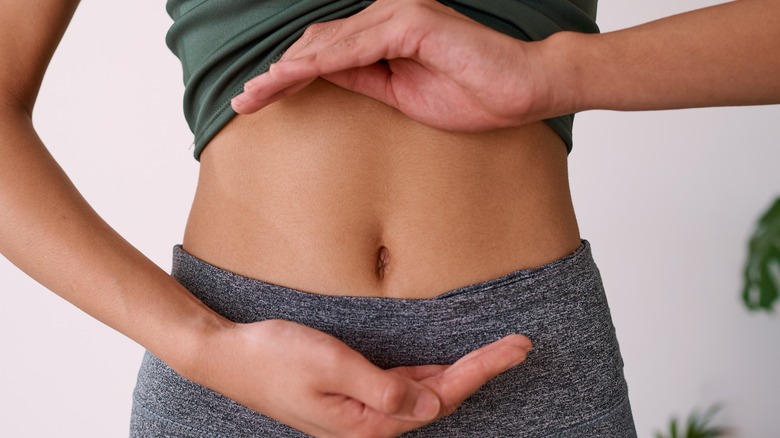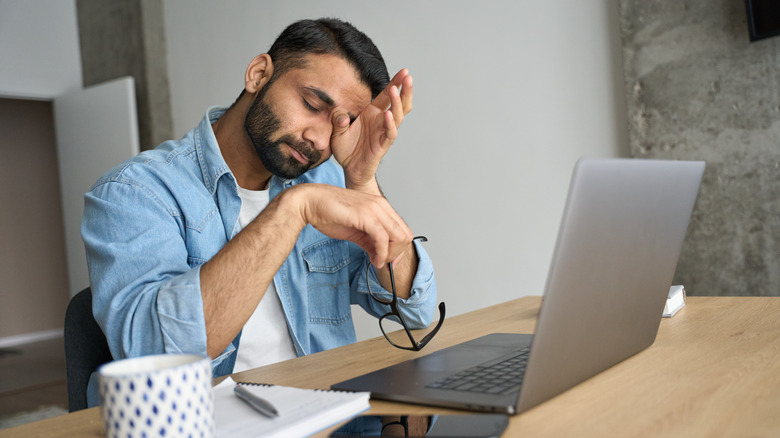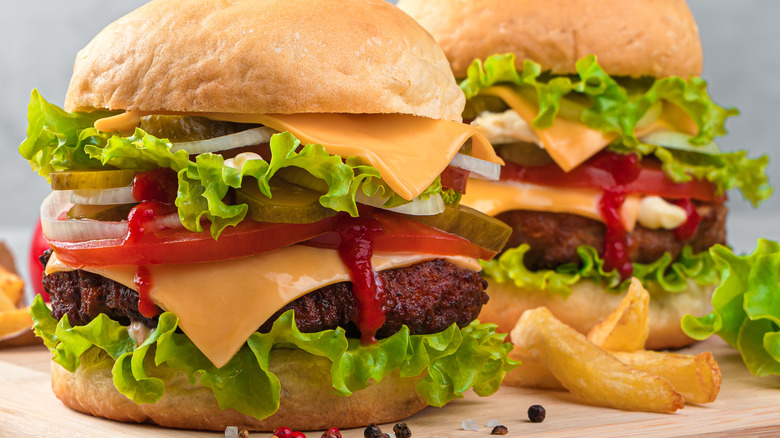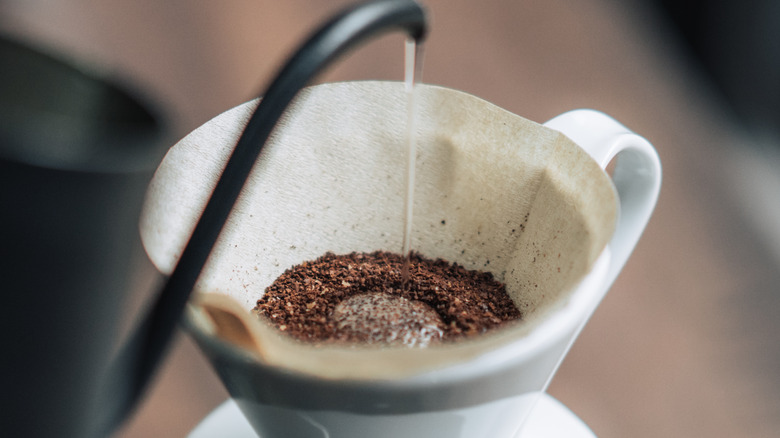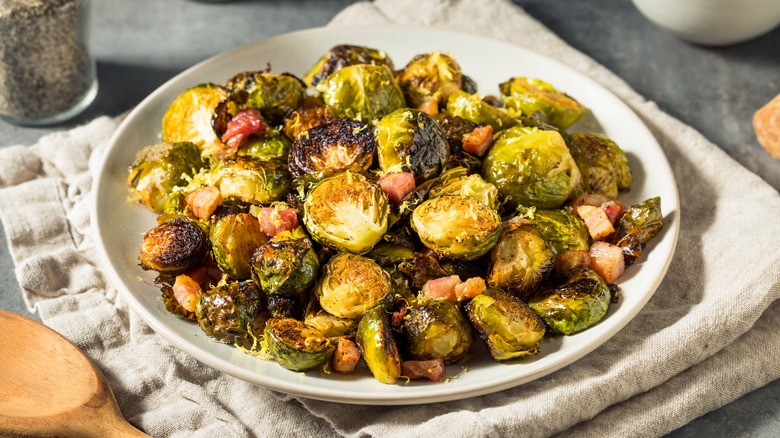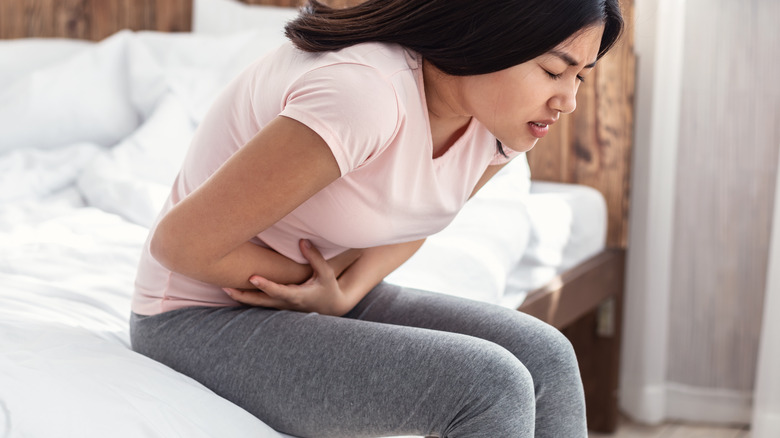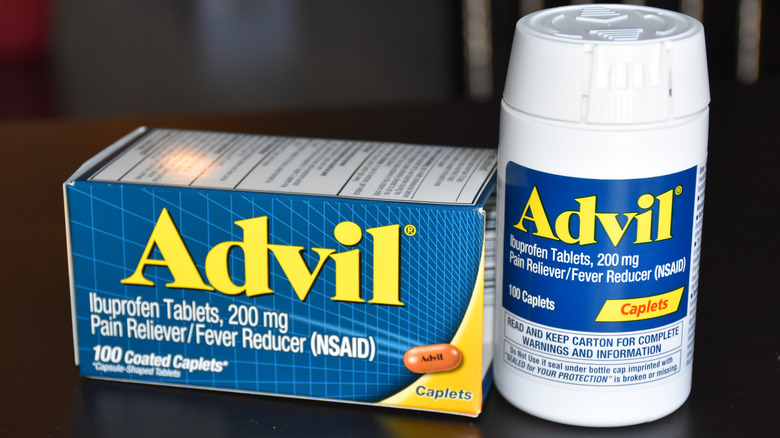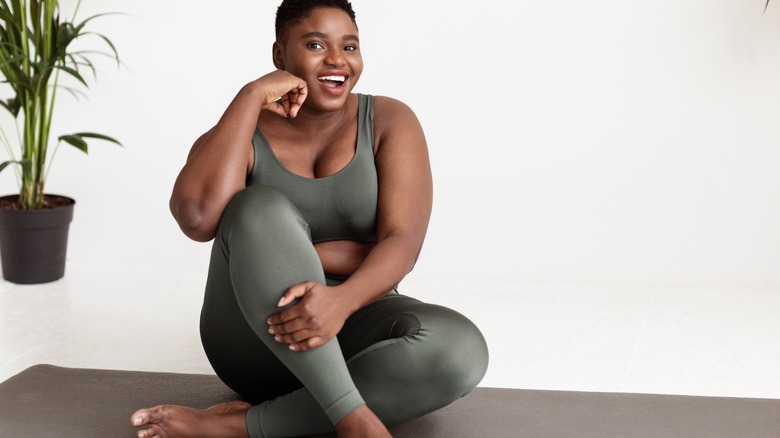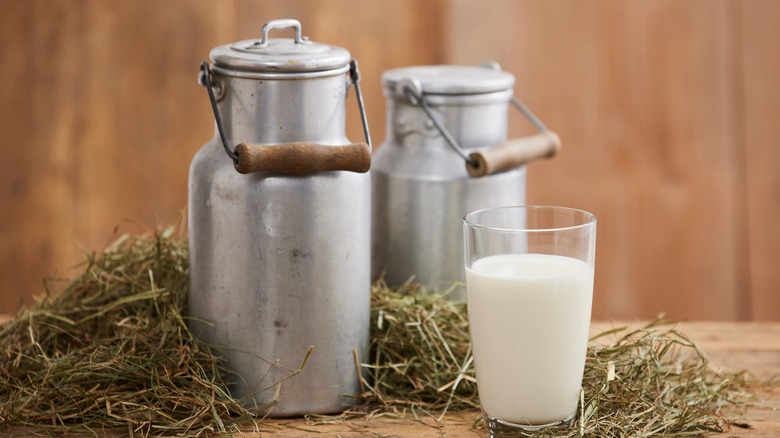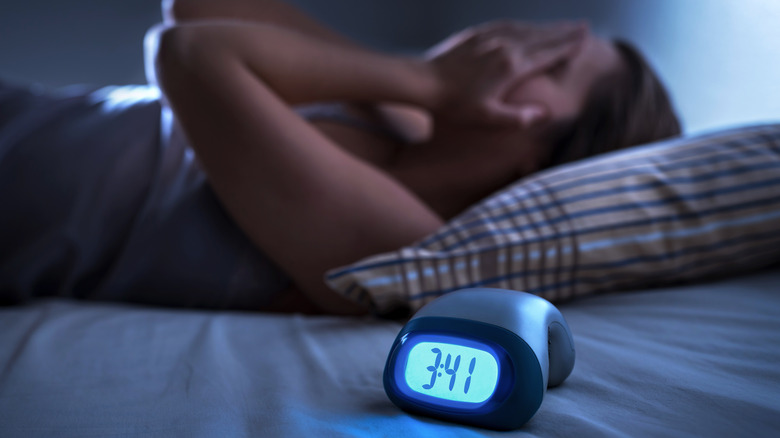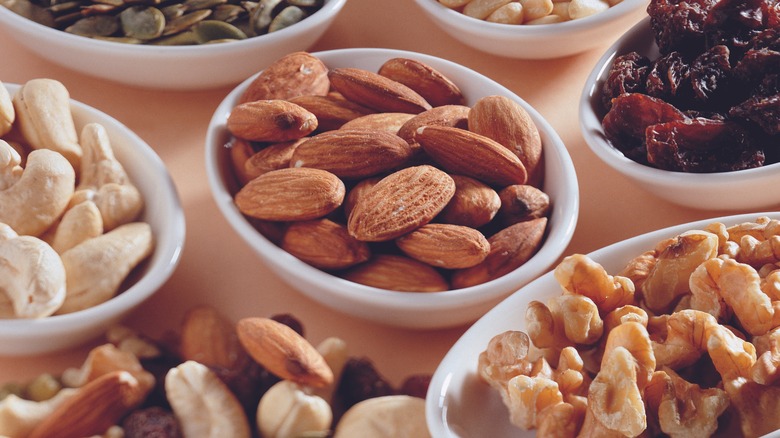14 Things You Shouldn't Do If You Have IBS
Irritable bowel syndrome (IBS) can be a challenge, even at the best of times. The condition, which affects up to 10% of people worldwide and between 25-45 million people in the United States (per About IBS), can cause some seriously uncomfortable moments, and prompts millions of trips to the doctor every year. And given that it's a lifelong condition, the stomach cramps, diarrhea, constipation, and bloating that can accompany IBS aren't things that can be fixed; rather, they need to be managed on a day-to-day basis, as the NHS points out.
The problem, though, lies in the fact that IBS can be pretty unpredictable. And what's more, we don't live in exactly the same way every single day, right? Plans change: For instance, when we visit a new restaurant, we just have to try that unusual dish. But these seemingly simple decisions (and more) could be having an impact on your IBS — and we're here to talk about a few of the things you really shouldn't be doing, in order to keep your condition under control.
Don't let your stress get out of hand
It's a tale as old as time. We start the week feeling refreshed, calm, and ready to take on the world. And then, as the days tick by, the pressures of work and life can stack up — and by Friday, you're feeling the stress and ready for a few days off.
Look, we hear ya. But enduring periods of frequent mental strain can be problematic for people with IBS. "Stress, anxiety and depression can trigger IBS," warns Henry Ford Health gastroenterologist Kimberly Tosch, who points out the clear connection between the mind and the gut (via Henry Ford Health). Tosch states that when stress or depression is reduced, potentially through the use of medication, this can subsequently reduce IBS symptoms and provide relief.
It's important to remember, though, that stress doesn't just manifest by ... feeling stressed. Stress can also be indicated through physical symptoms, like fatigue, fluctuations in weight, chest pains or tightness, and menstrual changes, as well as through IBS flare-ups (per Mind). Mental symptoms of stress could also include feeling lonely or disinterested in what's going on around you, or finding things less funny.
Avoid eating larger meals
When you're feeling ravenous, there are few things better than having a big meal placed in front of you. But if you have IBS, the feeling you have afterward could cause a considerable amount of regret.
Upon eating a meal, your stomach will start to indicate to your colon that things need to get moving to process the food effectively and digest things fully, states registered nutritionist Glenda Bishop (via IrritableBowelSyndrome.net). But when you eat larger portions, your colon can get kicked into overdrive, destabilizing your digestive system and creating painful symptoms, which may be accompanied by feelings of discomfort by just having too full of a belly.
The solution? Reduce the size of your plate. By consuming smaller meals, your digestion can process things at a normal pace, and you avoid the heavy, uncomfortable feeling you get when you eat something large. It's also worth trying to spread these out throughout the day (and eating a little more substantially between them with larger snacks), so that you're not going hungry.
You shouldn't drink too much coffee
Feeling tired? That's nothing a strong coffee can't fix. However, while glugging down a cup of Joe might assist your energy levels, it may not be your gut's best friend. "For those with IBS-D, coffee can be problematic because gut motility is already faster than it should be," warns gastroenterologist Niket Sonpal (via Well+Good). Upon drinking coffee, our bodies respond with cholecystokinin and gastrin, two hormones that speed up digestion. For people with IBS, this essentially means that your food is moving quicker, and your bowels can become irritated more easily.
There are some silver linings for people with IBS, however. Although highly caffeinated coffees may exacerbate your symptoms, going for a lighter roast (or ideally, a decaf coffee) could reduce the amount that you're triggered. Sonpal also states that if you normally have your coffee with sugar, removing it might help to ease symptoms, and adding in something to bring down the coffee's intensity (like oat milk or regular milk) may also make it less impactful on your bowels. The main thing to do, though, is to make any changes to your diet very slowly and observe the reaction.
Don't eat too many cruciferous vegetables
We're always taught in life that the more vegetables on our plate, the better, right? Well, most of the time, that's the case — unless you have IBS.
More specifically, it's cruciferous vegetables that could cause you some serious issues, as the Cleveland Clinic states. These vegetables, which include fridge mainstays like broccoli, cauliflower, arugula, and radish, have several compounds that can increase gas production, giving people with IBS a headache. One such component of cruciferous plants, known as raffinose, is actually indigestible by the human body and starts to ferment in the gut, creating more gas and a bloating sensation, says Mind Body Green.
Unfortunately for people with IBS, the list of vegetables that fall under the "cruciferous" banner is pretty long. Cabbage, Brussels sprouts, kale, watercress, bok choy, asparagus, and leeks can all wreak havoc gas-wise in your gastrointestinal system. It's far better to stick to vegetables that won't have this effect, like carrots, spinach, green beans, and celery. Tubers like sweet potato and yam are also a pretty safe bet.
Take note of your symptoms (and consult a doctor when necessary)
If you have IBS, especially if it's mild, it's pretty tempting to write off your symptoms as a fact of life. Sure, that meal you just ate triggered your IBS and left you facing a pretty uncomfortable night, but that's just the way it is, right?
Well, yes and no. While IBS is something that many people learn to live throughout their lives, it's also important to learn how best to manage your condition. Working with a registered dietitian nutritionist (or RDN) can help enormously with this, as Eat Right discusses. With them, you'll be able to take a full view of your lifestyle, your diet, and how your symptoms respond to different factors, and build a lifestyle plan that will minimize your condition's impact.
Moreover, while flare-ups may not cause any lasting damage, if you suddenly notice a significant change to your symptoms without any lifestyle change accompanying it, it's useful to speak to a doctor (per the International Foundation for Gastrointestinal Disorders). On occasion, IBS symptoms can collide with symptoms of other gastrointestinal issues, and if you consider this to be the case, contact your healthcare provider.
Try to avoid certain medications
As people, sometimes we get sick. It's just a fact of life, right? But when you're battling a headache or a fever, it's important to keep in mind that anything you're taking for it could have knock-on effects on your IBS.
"I sometimes tell patients to stay away from ibuprofen (like Advil® or Motrin®) and naproxen (like Aleve®) because they can cause stomach discomfort," states gastroenterologist Kimberly Tosch (via Henry Ford Health). If you're taking these medications consistently, they can then result in long-term issues like stomach ulcers, thanks to their ability to weaken the stomach lining, as the NHS states. And battling an ulcer while you also have IBS will just make your symptoms more challenging.
But here's the thing: If you're struggling with aches and pains, you can't just ignore them. Luckily, your choice of medication could be key. "If you need something for pain, Tylenol® (acetaminophen) is the best option," says Tosch. Tylenol can provide pain relief while also being less impactful on your stomach than NSAIDs (per Tylenol). However, it's important to monitor your IBS symptoms after taking it, and never to exceed the recommended dose.
You shouldn't skip your workout
If you've just experienced a flare-up of IBS symptoms, the tempting thing to do is to lay low and avoid anything that'll trigger it again. And for some folks, this means not putting your body through too much strain by exercising. But exercising when you have IBS may be helpful for your symptoms, as Healthline states. This is especially the case when you incorporate regular exercise into your lifestyle long-term, with a study published in the World Journal of Gastroenterology showing that when people continued to exercise over several years, their IBS symptoms were consistently less prevalent.
There are certain types of exercise, too, that can prove particularly beneficial for people with IBS. Swimming and cycling are two excellent choices, thanks to your ability to choose your own pace and intensity, plus the lower-impact nature of both activities (per Everyday Health). Yoga could also be a winner, as "the focus on the mind-body connection improves the messages traveling from the brain to the gut and the gut to the brain," says Mayo Clinic gastroenterologist Brian E. Lacy.
The most important thing to do when you're picking an exercise, though, is to make sure you enjoy it. "The best exercise is the one that you will do and stick with," says gastrointestinal psychologist Megan Riehl. We think that's pretty good advice.
Drinking too much alcohol can worsen IBS
After a busy week, heading to the bar with your friends and sinking a few cold ones is, for some, a sacred practice. But if you have IBS, it's a wise idea to keep your eye on how much you're drinking.
Alcohol can be especially triggering to some people with IBS, thanks to its potential irritant effect on your gut, says gastroenterologist Gregory Seltzer (via Virtua Health). When this happens, your symptoms can be provoked, causing discomfort, bloating, and potentially even a change in stool texture, depending on how much alcohol causes you to flare up.
As triggers around alcohol can vary from person to person, you might find that it's only particular types of booze that cause you to flare up. Other times, you may notice that it's the alcohol itself that makes your IBS symptoms recur, and removing it from your diet entirely is the only thing that will help. The best way to discern what your trigger around alcohol is to eliminate it, and then try introducing different alcohols back in, one by one, to see if any are worse or better than others.
Don't lose track of your trigger foods
Folks who have IBS are well aware of how much their diet can impact their symptoms. But it's also totally natural to want to have a varied, versatile diet that isn't bland. Thankfully, this is still entirely possible if you live with the condition, but it's also imperative that you identify your trigger foods and limit them as much as possible. Milk and certain dairy products are one such food, with a large number of people with IBS experiencing discomfort when they consume them — although yogurt may still be fine to consume, thanks to the probiotics in it making it easier to digest (per Johns Hopkins Medicine).
Food items that contain fructose may also be a trigger for some, thanks to fructose's potential ability to cause digestive issues. While sugary snacks containing high fructose corn syrup are naturally off the menu, it's also important to remember that naturally-occurring fructose is also present in a lot of fruits. Bear in mind, too, that even small food items, like sugar-free gum, can be problematic for some people, as the xylitol and sorbitol that gives it its sweet taste instead of sugar may also promote irregular bowel movements.
Make sure you're not getting poor sleep
The benefits of achieving a good eight hours every night are almost too long to list, with heart health, immunity, and mental function all being improved by a solid slumber (as well as, you know, not being in a terrible mood), according to BUPA. And people who have IBS will have another solid reason to turn their lights off at an appropriate time, thanks to the correlation between good sleep and reduced symptoms. As a study published in BMC Research Notes shows, individuals who had poorer sleeping habits also generally exhibited poorer outcomes for their IBS, with "poor psychological well-being" also being present the less sleep you got.
Sleeping when your IBS is triggered can be trickier, for sure, which is why practicing good sleep hygiene is essential to maximize your ability to drop off at night. Performing a little light yoga, or lighting some candles with calming scents, may usher you into a more relaxed state and increase your chances of sleep (per IrritableBowelSyndrome.net). It's also important to keep an eye on your trigger foods throughout your day, to reduce the likelihood of your IBS being aggravated by the time you go to bed.
Certain workouts can make your IBS worse
Exercise can have a positive effect on IBS symptoms, with working out potentially causing better gut motility, reducing bloating, and helping you reduce stress (per Healthline). But not all exercise is created equal, and in certain situations, working out could further aggravate IBS symptoms.
High-intensity interval training (or HIIT) may make your symptoms more severe, thanks in part to the efficiency of the exercise and its ability to burn calories fast. "When the body is burning too many calories, digestion can become impaired," states registered dietitian nutritionist Emily Van Eck (via Livestrong). HIIT training may also prompt your body to create cortisol, which in turn could affect your bowels for the worse.
And folks who enjoy longer runs or cycles may want to pull back if they have IBS. By performing extensive endurance exercise, your system diverts blood flow from your gut to fuel other parts of your body. And when this happens, your gut can suffer, creating diarrhea in some people. It's far better to stick to lighter exercise (like yoga, tai chi, or walking) to ensure that you don't stress your body out too much.
Keep track of your symptoms
If you live with IBS, it can be pretty tempting to feel like you know the score. After all, it's your body, right? No one knows it, or your symptoms, better than you. But it's important not to rest on your laurels, and to remember that rigorously keeping track of your symptoms can actually help keep them down. A study published in the World Journal of Gastroenterology found that when people self-monitored their symptoms using digital means, they reported better overall results for their IBS.
And the good news is, these days, there's an app for that. Actually, there are quite a few to choose from. Bowelle is an easy-to-use app that not only allows you to keep track of your symptoms, but also presents them to you in handy charts, to better understand the fluctuation of your condition — and the best part is that it's free, says Bimuno. Cara Care, a doctor-developed app, is another popular choice with free and subscription models, allowing you to aggregate data on your IBS to better understand your triggers and how to avoid them in the future.
Try not to remove fiber from your diet
When it comes to IBS, there's a temptation to try and start to limit fiber. And on the surface of things, it does make sense. After all, consuming higher amounts of fiber can produce a range of gastrointestinal symptoms, like gas, bloating, cramps, or changes in your poop pattern (per Medical News Today) — which is exactly what you're trying to battle when you have IBS. But the thing is, fiber can be instrumental in managing symptoms, so you shouldn't discount it just yet.
A review published in the International Journal of Molecular Medicine discusses the fact that adding fiber to the diet, even through fiber supplements, is "both safe and effective in improving IBS symptoms globally," in addition to providing other juicy health benefits like keeping your cholesterol in check. And if you're concerned about how you can get enough fiber, it's easier than you think. Simply add a couple of fiber-rich vegetables into meals, or snack on a few pieces of fruit or a handful of nuts a day, as a simple way to work your way up to the recommended fiber levels (per the International Foundation for Gastrointestinal Disorders).
Don't try and do it without help
Living with IBS can feel like a one-person battle a lot of the time: At the end of the day, it's just you and your gut. But sometimes, this can lead to a complicated relationship with your condition — and there's no denying that on occasion, it can be a pretty hard syndrome to carry with you through life. That's why it's super important to remember that you're not alone in your journey with IBS, and finding ways to discuss it with friends, family, and support services could ease any stress you may have around it (via WebMD). It can also be helpful to be open about your condition at work with your manager or co-workers, so they can better understand how to make your working environment as easy as possible.
It can also make your life much easier to consider your condition when planning activities. If you're heading out for a meal, for example, or a party where there'll be food, don't be afraid to ask what's going to be on your plate, as it could save you from discomfort later on. And most of all, remember that a problem shared is a problem halved. "I encourage people to talk to their friends about their condition, and then they find often that (the friend) has, for example, an eczema that she's embarrassed about," states Mind Body Digestive Center family therapist Mary-Joan Gerson.

